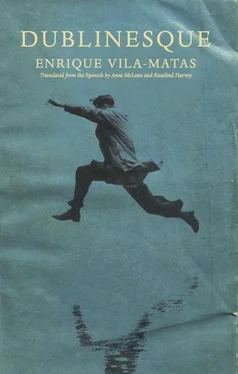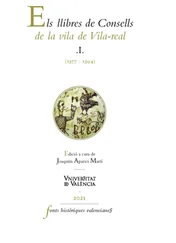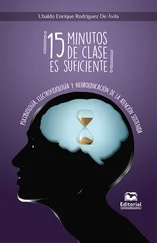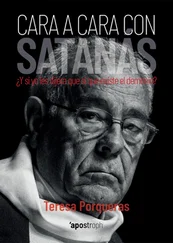Suddenly his father turns around in his armchair, and in a gloomy tone of voice, as if consumed by a feverish melancholy, says he’d like someone to explain something to him. And he repeats it twice, very anxiously. Riba’s never seen him in such a dismal mood: he’d like someone to explain something to him.
“What, Dad?”
Riba thinks he’s referring to the great peals of thunder, and patiently starts to explain the origin and cause of certain types of storms. But he soon realizes what he’s saying sounds ridiculous, and moreover, his father is looking at him as if he’s stupid. He pauses tragically and the pause becomes eternal, he can’t carry on talking. Perhaps now he might resolve to tell them something about Lyon. As things stand, it might even be an opportune moment to distract them by describing the literary theory he put together there. He could say he wrote the theory on a cigarette paper and then smoked it. Yes, he should tell them things like that. Or instead, to stir things up even more, ask them that question he hasn’t asked for years now: “Why did Mom convert to Catholicism? I need an explanation.”
He knows it’s useless, that they’ll never answer this.
He could also tell them about Julien Gracq and about the day he visited him and went out with the writer onto the balcony of his house in Sion, and Gracq contemplated bolts of lightning, and with particular attention, what he called the unleashing of erroneous energy .
His father interrupts the long pause to tell him, with a smug smile, that he is perfectly aware of the existence of altocumulus clouds and so forth, but he isn’t asking his son to tell him about things he learned in his long-ago school days.
A new silence follows, this time even longer. Time passes extraordinarily slowly. Mixed with the rain and “the unleashing of erroneous energy” is the ticking of the clock on the wall that, when it was in a different room of this apartment, witnessed his birth, almost sixty years ago. Suddenly all three of them stop moving and stay almost motionless, stiff, exaggeratedly stern — not at all exuberant, very Catalan, expecting who knows what, but definitely waiting. They have just begun the tensest wait of their lives, as if listening for the thunderclap that must arrive. Then suddenly the three of them are totally motionless, more expectant than ever. His parents are shockingly old, this is patently obvious. It’s not surprising they haven’t found out that he no longer has the publishing house and that he sees far fewer people than he used to.
“I was talking about the mystery,” says his father.
Another long pause.
“Of the unfathomable dimension.”
An hour later, the rain has stopped. Riba is preparing to escape the trap of the parental home when his mother asks him, almost innocently:
“And what plans do you have now?”
He says nothing, not having expected that question. He has no plans for the immediate future, not even a wretched invitation to some publishers’ conference; no book launch to at least show his face at; no new literary theory to write in a hotel room in Lyon; nothing, absolutely nothing at all.
“I can see you don’t have any plans,” his mother says.
His self-esteem wounded, he lets Dublin come to his rescue. He remembers the strange, striking dream he’d had in the hospital when he fell seriously ill two years ago: a long walk through the streets of the Irish capital, a city he has never been to, but which, in the dream, he knew perfectly well, as if he’d lived there in another life. Nothing astonished him as much as the extraordinary precision of the dream’s many details. Were they details from the real Dublin, or did they simply seem real due to the dream’s unparalleled intensity? When he woke up, he still knew nothing about Dublin, but he felt totally, strangely certain he had been walking through the streets of this city for a long time, and found it impossible to forget the only difficult part in the dream, the one where reality became strange and upsetting: the moment his wife discovered he had started to drink again, there, in a pub in Dublin. It was a difficult moment, more intense than any other in that dream. Caught by surprise by Celia on his way out of a pub called the Coxwold, in the midst of his latest unwelcome drinking binge, he embraced her sadly, and the two of them ended up crying, sitting on the curb of a Dublin side street. Tears were shed in the most disconsolate situation he had ever experienced in a dream.
“Oh my God, why have you started drinking again?” asked Celia.
A difficult moment, but a strange one too, maybe related to his having recovered from physical collapse and being reborn. A difficult, strange moment, as if there was some kind of message in their pathetic weeping. A singular moment due to how especially intense the dream became — an intensity he had only known before when, on repeated occasions, he dreamt he was happy because he was in New York — and because suddenly, almost brutally, he felt he was linked to Celia beyond this life, an incommunicable feeling it was impossible to demonstrate, but as powerful and personal as it was genuine. A moment like a stab of pain, as if for the first time in his life he felt alive. A very subtle moment, because it seemed to contain — like a puff of air, the dream coming from someone else’s mind — a hidden message that placed him just one step away from a great revelation.
“We could go to Cork tomorrow,” Celia was saying.
And that’s where it all ended. As if the revelation were waiting for him in the port city of Cork, in the south of Ireland.
What revelation?
His mother clears her throat impatiently when she sees him so pensive. And now Riba is worried that she is reading his mind — he has always suspected that, being his mother, she can read it perfectly — and she has discovered that her poor son is destined to fall off the wagon again.
“I’m planning a trip to Dublin,” Riba says, this time getting straight to the point.
Up until this precise moment it has rarely, if ever, crossed his mind to go to Dublin. Not speaking English well has always put him off. For business, he always felt it was enough to attend the Frankfurt Book Fair. He used to send his secretary Gauger to the London Book Fair. Gauger was always a huge asset whenever the English language proved essential. But perhaps now the time has come for everything to change. Didn’t it change two years ago for Gauger, who took his life savings and a sum of money Riba suspects he stole from him, and left to go and live in a great big hotel in the Tongariro region of New Zealand, where his stepsister was waiting for him? And anyway, didn’t Celia’s young lover, the one she had before she met Riba, come from Cork?
With charming innocence, his mother asks what he is going to do in Dublin. And he answers with the first thing that comes into his head: that he is going on the sixteenth of June, to give a lecture. Only once he has answered does he realize that this is precisely the day of his parents’ sixty-first wedding anniversary. And what is more, he also realizes that “61” and “16” are like heads and tails of the same number. The sixteenth of June, meanwhile, is the day on which Joyce’s Ulysses takes place, the Dublinesque novel par excellence and one of the pinnacles of the age of print, of the Gutenberg galaxy, the twilight of which he is having to live through.
“What’s the lecture about?” asks his father.
Brief hesitation.
“It’s about James Joyce’s novel Ulysses , and the Gutenberg constellation giving way to the digital age,” he replies.
It was the first thing that occurred to him. Afterward he pauses, and then, as if dictated by an inner voice, he adds:
Читать дальше












